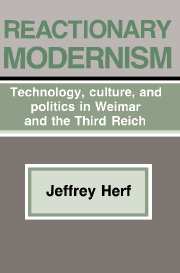Book contents
- Frontmatter
- Contents
- Preface
- 1 The paradox of reactionary modernism
- 2 The conservative revolution in Weimar
- 3 Oswald Spengler: bourgeois antinomies, reactionary reconciliations
- 4 Ernst Jünger's magical realism
- 5 Technology and three mandarin thinkers
- 6 Werner Sombart: technology and the Jewish question
- 7 Engineers as ideologues
- 8 Reactionary modernism in the Third Reich
- 9 Conclusion
- Bibliographical essay
- Index
2 - The conservative revolution in Weimar
Published online by Cambridge University Press: 31 October 2009
- Frontmatter
- Contents
- Preface
- 1 The paradox of reactionary modernism
- 2 The conservative revolution in Weimar
- 3 Oswald Spengler: bourgeois antinomies, reactionary reconciliations
- 4 Ernst Jünger's magical realism
- 5 Technology and three mandarin thinkers
- 6 Werner Sombart: technology and the Jewish question
- 7 Engineers as ideologues
- 8 Reactionary modernism in the Third Reich
- 9 Conclusion
- Bibliographical essay
- Index
Summary
World War I was a source of hope for those German cultural pessimists who believed in the possibility of a radical reversal of the process of degeneration they felt was threatening the nation's body and soul. Their message was not primarily that the world was godforsaken but that it could be redeemed and the deterioration halted and reversed. These hopes put the nationalists of the postwar era at odds with antiindustrial themes in German nationalism. A limited incorporation of technology into nationalist imagery and language had occurred in the late nineteenth century, but mainly on the part of engineers.
The novelty in the postwar discussions of technology and culture in Germany was that for the first time the nontechnical intellectuals were trying to integrate technology into nationalist language. Like the rest of National Socialism – and European fascism – these nationalist ideas took on a tougher tone as a result of the Fronterlebnis of World War I, incubated in the hothouse cultural controversies of the postwar years, and came to political fruition in Nazi propaganda. The confrontation between Technik und Kultur did not begin in the Weimar Republic. The major technological advances of the first and second industrial revolutions based on steam, electricity, and chemistry had been introduced to Germany in the nineteenth century, and the jargon of authenticity, German romanticism, the apolitical tradition, and mistrust of the Enlightenment also accompanied the rise of the Prussian Reich.
Yet although the confrontation between technology and culture did not begin in Weimar, it certainly came to a head in those years. It even had a name of its own, die Streit um die Technik, the debate about technology.
- Type
- Chapter
- Information
- Reactionary ModernismTechnology, culture, and politics in Weimar and the Third Reich, pp. 18 - 48Publisher: Cambridge University PressPrint publication year: 1985



